Unit 1Will people have robots?|Sectioan B
文档属性
| 名称 | Unit 1Will people have robots?|Sectioan B | 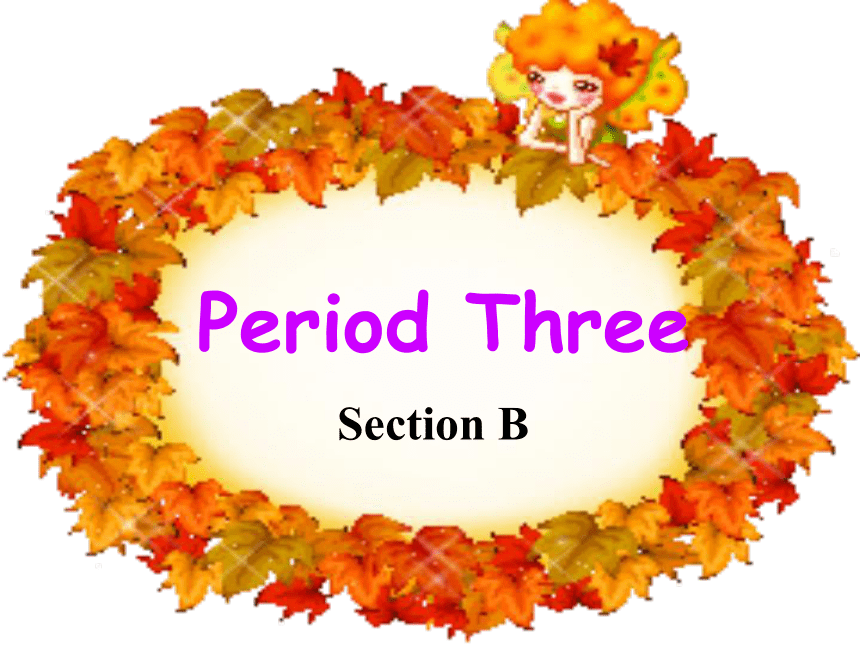 | |
| 格式 | rar | ||
| 文件大小 | 4.4MB | ||
| 资源类型 | 教案 | ||
| 版本资源 | 鲁教版(五四学制) | ||
| 科目 | 英语 | ||
| 更新时间 | 2010-09-08 19:11:00 | ||
图片预览

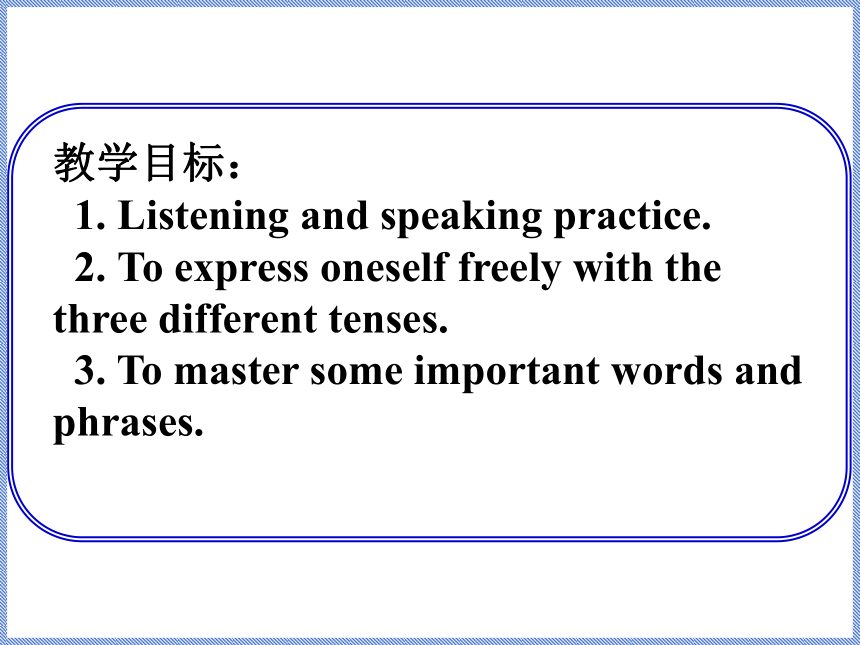
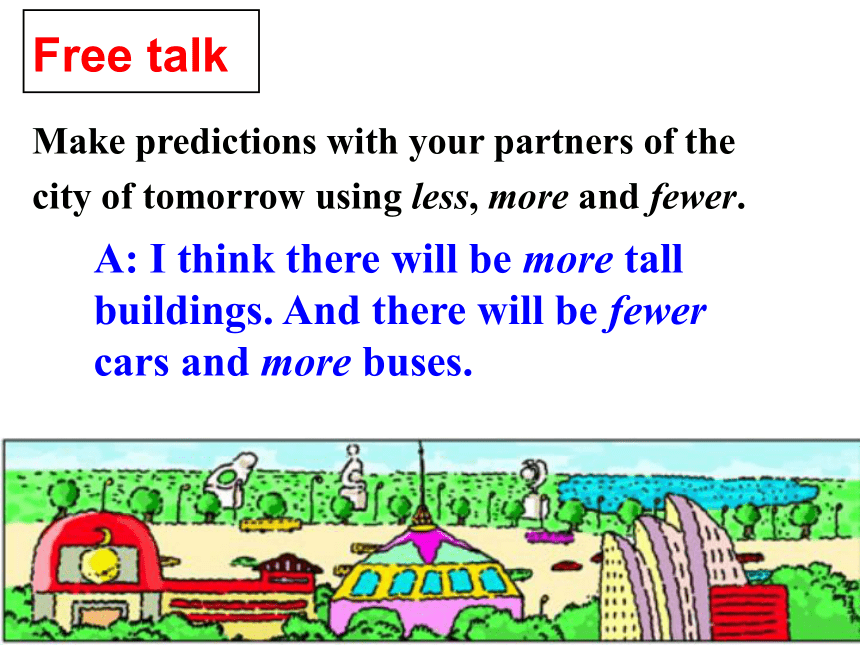
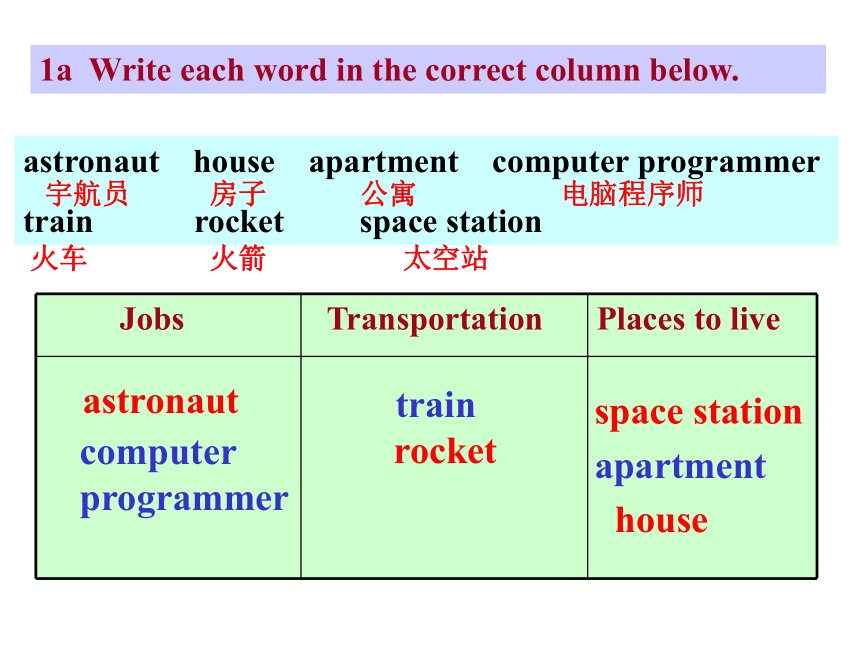
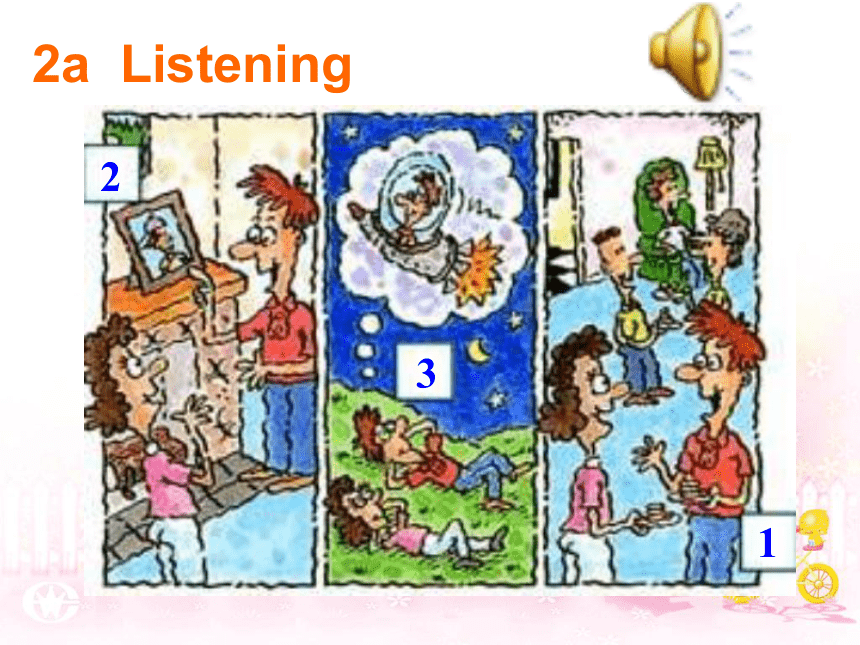
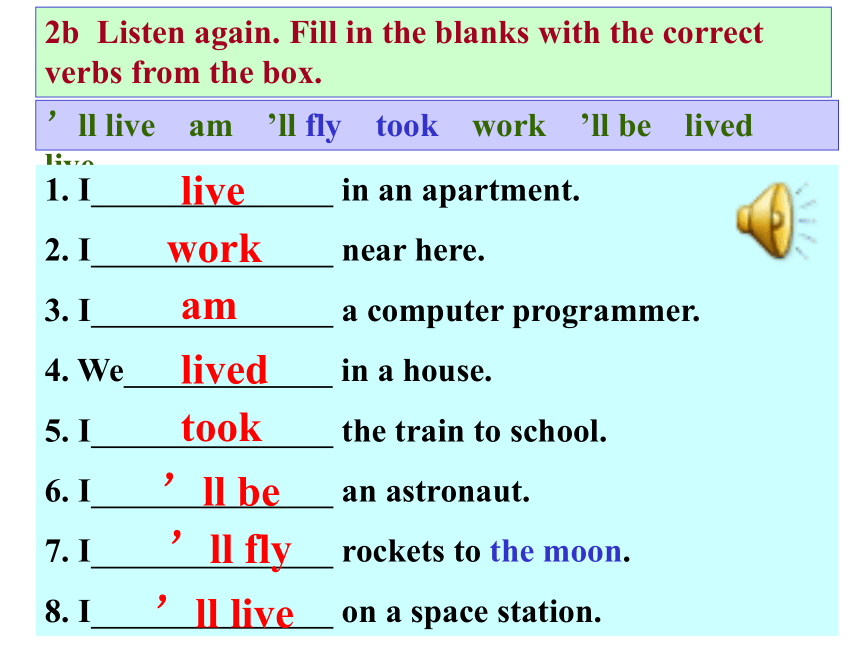
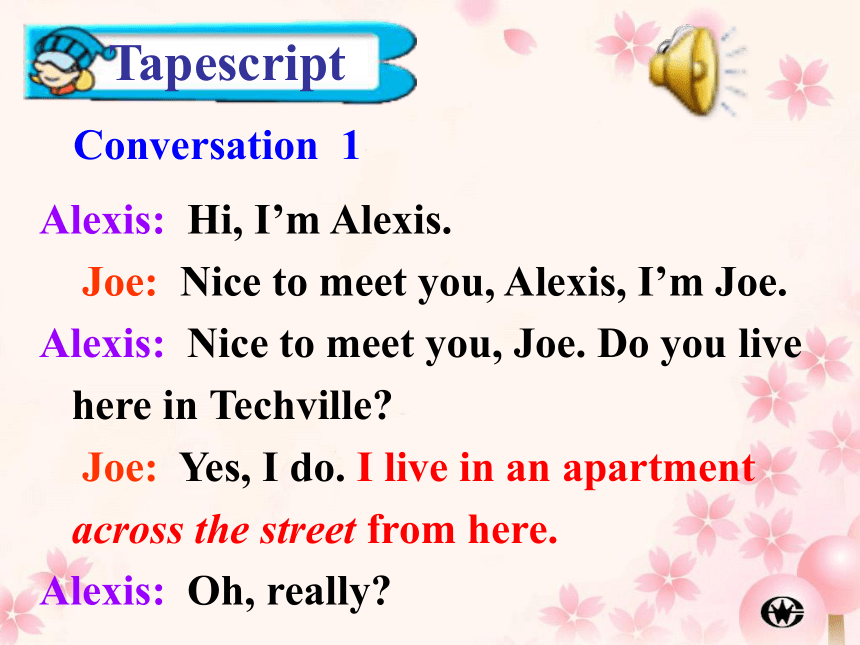
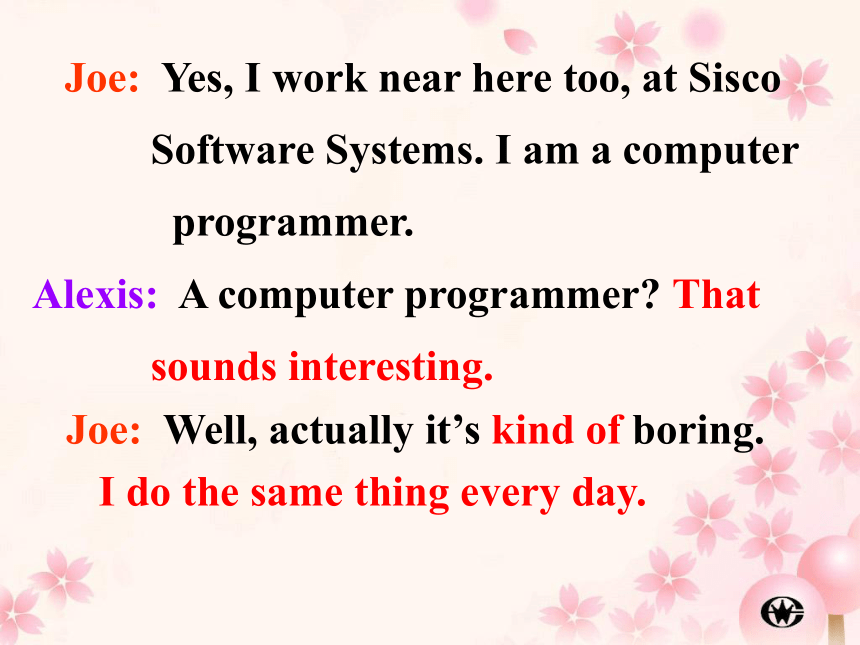
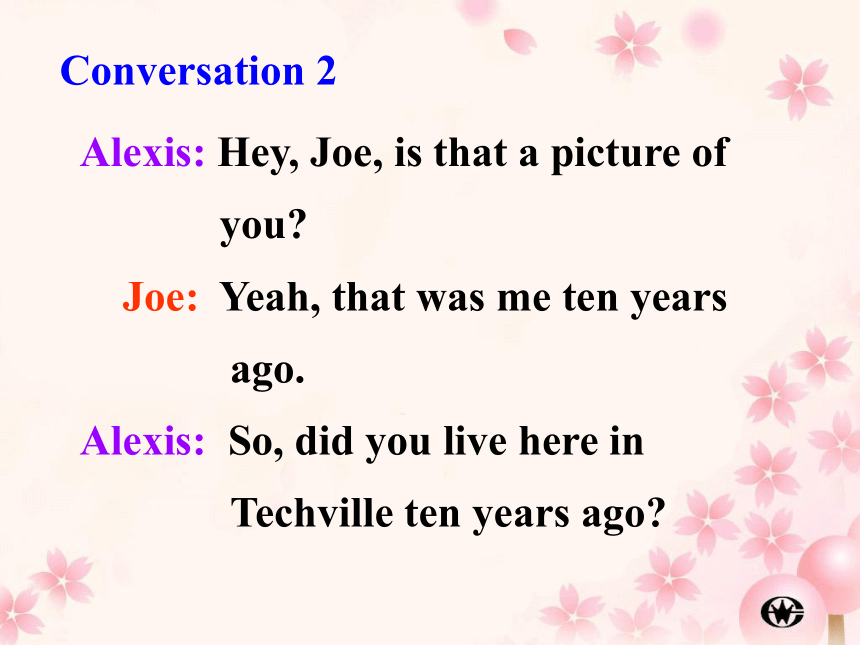
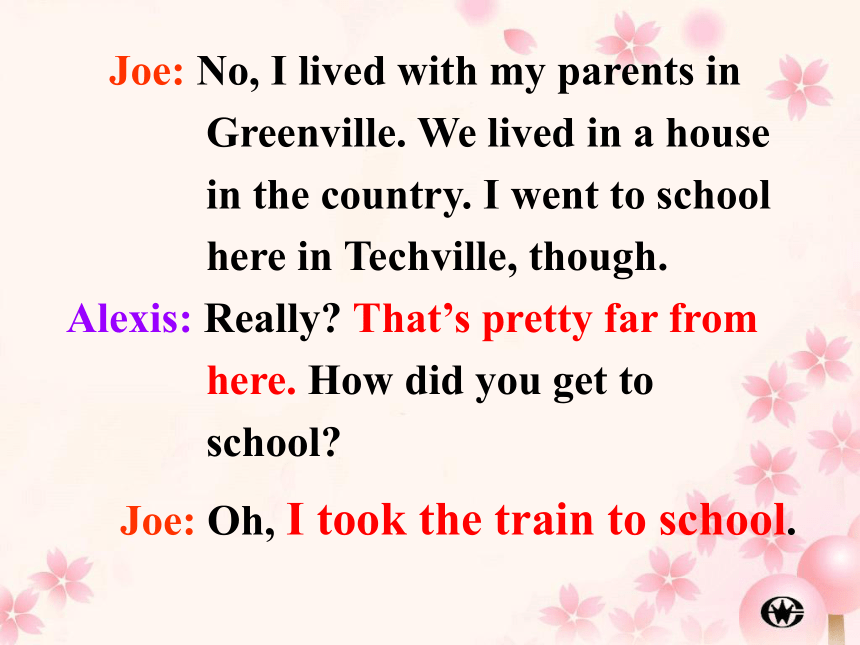
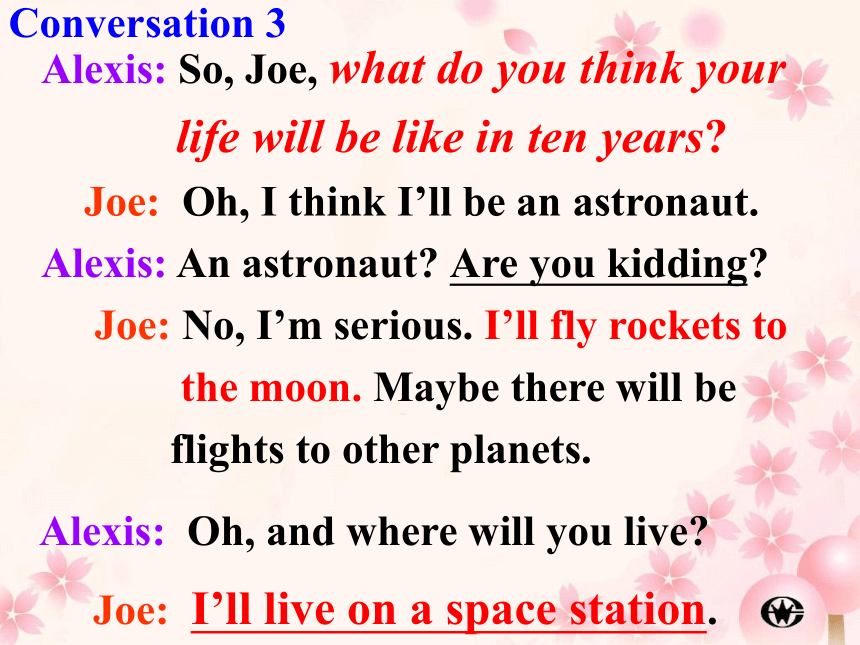
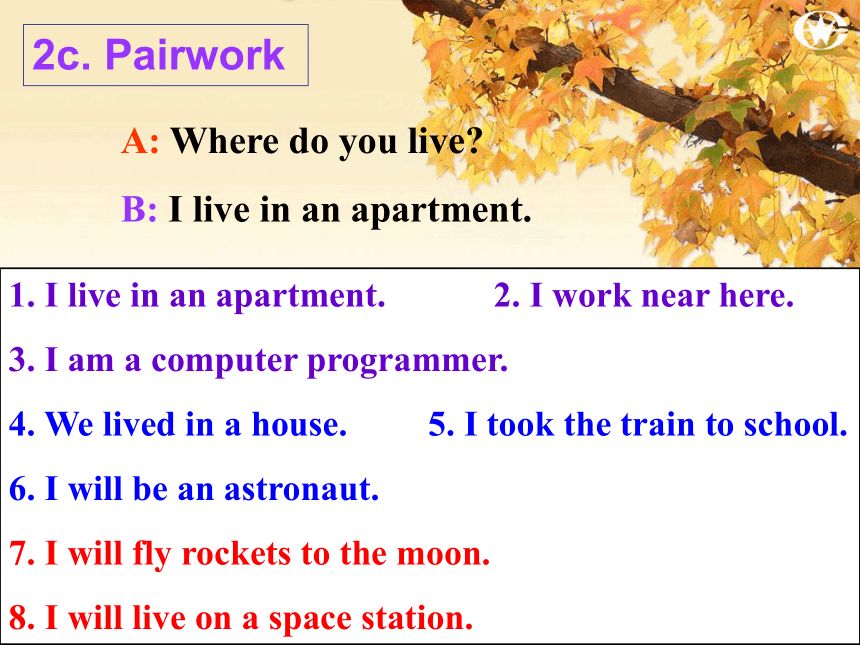
文档简介
课件41张PPT。Period ThreeSection B教学目标:
1. Listening and speaking practice.
2. To express oneself freely with the three different tenses.
3. To master some important words and phrases.Make predictions with your partners of the city of tomorrow using less, more and fewer.Free talkA: I think there will be more tall buildings. And there will be fewer cars and more buses.1a Write each word in the correct column below.astronaut house apartment computer programmer
train rocket space station宇航员公寓火箭太空站房子电脑程序师火车astronautcomputer programmertrainrocketspace stationhouseapartment2a Listening1322b Listen again. Fill in the blanks with the correct verbs from the box.’ll live am ’ll fly took work ’ll be lived live1. I in an apartment.
2. I near here.
3. I a computer programmer.
4. We in a house.
5. I the train to school.
6. I an astronaut.
7. I rockets to the moon.
8. I on a space station.liveworkamlivedtook’ll be’ll fly’ll liveAlexis: Hi, I’m Alexis.
Joe: Nice to meet you, Alexis, I’m Joe.
Alexis: Nice to meet you, Joe. Do you live here in Techville?
Joe: Yes, I do. I live in an apartment across the street from here.
Alexis: Oh, really?TapescriptConversation 1 Joe: Yes, I work near here too, at Sisco
Software Systems. I am a computer
programmer.
Alexis: A computer programmer? That
sounds interesting. Joe: Well, actually it’s kind of boring. I do the same thing every day.Alexis: Hey, Joe, is that a picture of
you?
Joe: Yeah, that was me ten years
ago.
Alexis: So, did you live here in
Techville ten years ago?Conversation 2 Joe: No, I lived with my parents in
Greenville. We lived in a house
in the country. I went to school
here in Techville, though.
Alexis: Really? That’s pretty far from
here. How did you get to
school?
Joe: Oh, I took the train to school.
Alexis: So, Joe, what do you think your
life will be like in ten years?
Joe: Oh, I think I’ll be an astronaut.
Alexis: An astronaut? Are you kidding?
Joe: No, I’m serious. I’ll fly rockets to
the moon. Maybe there will be
flights to other planets.Conversation 3Alexis: Oh, and where will you live?
Joe: I’ll live on a space station.2c. PairworkA: Where do you live?
B: I live in an apartment.1. I live in an apartment. 2. I work near here.
3. I am a computer programmer.
4. We lived in a house. 5. I took the train to school.
6. I will be an astronaut.
7. I will fly rockets to the moon.
8. I will live on a space station.Summary1.重点词汇和句子:
词汇:astronaut apartment rocket
computer programmer space station
句子:
I live in an apartment across the street from here.
what do you think your life will be like in ten years?
…2.根据事件的具体情况采用不同的时态对事件做出准确的描述。(对学过的不同时态要运用自如)I will be an a and I will work on the
space station. I will f rockets to the
moon and mars in 10 years. In summer I like
to go s in the lake every day. I am
good at computers, and I will be a computer
p in 10 years. National day is
coming, I will go to Hong Kong on v .
Most students live in an a with their
classmates.stronautlywimmingrogrammeracationpartmentⅠ.根据本节课的听力词汇和内容填空。Ⅱ.用所给词的适当形式填空。
1. I have (little) water than you.
2. Sally ( have) a nice car in five years.
3. Listen! Someone (sing) an English
song outside.
4. Amy (play) basketball very well five
years ago.
5. There (not) be any paper books.
Everyone will have books on computers.lesswill haveis singingplayedwon’tHomework1.掌握课本的基本句型并完成练习册的相关习题。
2. 预习P5短文3a。Period Four教学目标:Reading and writing practice.
Be able to imagine the life in the future and exchange ideas with others.Free talk:What will your life be like in ten years?( ) 1. In ten years, the writer will be a manager.
( ) 2. The writer went to Hong Kong last year.
( ) 3. The writer has some pets now.
( ) 4. She will live with her friends.
( ) 5. She will dress casually during the week.TFFFFListen and write T or F. reporter parrot, many others skating, swimmingShanghai, Hong Kong, Australiato wear a suit (during the week), to dress more casually (at the weekends )What will Ming’s life be like in ten years?Read the text and fill in the chart. 1. alone adj.(只作表语) 孤单的
adv. 独自;单独
He was alone in the house.
他一个人在屋里。
I went to the movies alone. I felt lonely.
我独自去看电影了,我觉得很孤独。Language points [注] alone 表示“单独的,独自一人的”,不含感彩.做形容词时,只能在be动词或系动词之后做表语。与lonely不同,lonely表示“孤独的,寂寞的”含有丰富的感彩. lonely做形容词时,可做定语和表语。
如: a lonely village 孤寂的村庄.
be/ feel lonely 感到孤单keep: v. 保持;维持;喂养
1). keep + sb. / sth. +形容词 使某人/某物…
The job kept them busy for a year. 这项工作让他们忙碌了一年。
2). keep +形容词 保持
The man ran up and down to keep warm. 这个人来来回回地跑着取暖。2. I might even keep a pet parrot. 3. can vs be able to相同点: 两者都表示能力
不同点:
1). can只有现在式和过去式。
2). be able to可用于现在时、过去时和将来时。1. He _____ drive a car.
2. He ____________ do the job when he
grows up.canwill be able to A: I think that France will win the next World Cup.
B: I disagree. I think that Brazil will win next year.PairworkSelf Check1 Fill in the blanks with the words given. wear work look fly keep1. I want to for myself when I’m older.
2. My friends a pet pig in their house.
3. I need to smart for my job interview.
4. We have to a uniform to school.
5. One day people will to the moon for vacations.workkeeplookwearflyput on指“戴上”,“穿上”,表示穿衣服的动作。
wear 是“穿着”,“戴着”的意思,wear接衣服(穿衣、穿鞋、戴帽子,戴手套、佩戴首饰等)等,可用进行时, ,强调状态。
dress 可作及物动词,有“穿着”,“打扮”的意思,但只用于穿衣,它既表示动作,又表状态,常用于下列结构:dress sb. / oneself(给某人穿衣服) put on, wear, dress 2 Read the passage and circle the inventions on the right. Predicting the future can be difficult. There are many famous predictions that never came true. Before 1929, there was no sound in movies. The head of one of the biggest movie companies in the United States predicted that no one would want to see actors talk. Of course, he was wrong! In 1977, the head of the largest computer company in the United States said, “No one will want to have a computer in his or her home.” He thought that computers would never be used by most people.predict v. 预言future n.将来;未来prediction n.预言come true 实现;达到 come---camecompany n.公司 (复数companies)think---thoughtsee sb. do sth. 看到某人做某事(make, let, hear, watch)3. Find these words from this unit.1. A place to live in space: _________________
2. Something kids will use to study at home: _____________
3. These will be in every home: ____________
4. Yang Liwei is a famous Chinese ______________.space stationastronautcomputersrobotsSummary1. 重点句子:
(1) What will your life will be like in ten years?
(2) …fell in love with it.
(3) I might even keep a pet parrot.
(4) I’ll be able to dress more casually.2. 区别用法:(1) alone vs lonely
(2) can vs be able to
(3) put on, wear, dress Exercises 1.There won’t be any_____ _______(钞票). 2.The students hope teachers will give them_____(少) homework than last term.
3.Mr Brown came to China last year and he soon_____ _____ _____ _____(喜欢上)this great country.
4.We have successfully sent many_______ (火箭)into space.paper moneyfell in love withrocketsless 一、根据汉语意思完成句子。1. We have to _____ a uniform to school.
2. ______ your coat when you go out.
3. Can he _____ himself?wearPut ondress 二、选择wear, put on , dress 填空,并注意用其适当形式。 4. Our Chinese teacher _____ a pair of glasses.
5. Please _____ the baby, George.
6. She often _____ a red skirt.wearsdresswears (1) Where _____ you ______ (live) five years ago?
I ______ (live) in Changsha.
(2) He _______ (be) a teacher after he leaves college.
(3) Now he ______ (have) lots of free time, but he ________ ( have) less free time in ten years.didlivelivedwill behaswill have 三、用所给动词的适当形式填空。 (4) There _____ ______ (be) fewer children in people’s homes in 10 years.
(5) _____ they ______ (play) football after school next Monday?
No, they _______. willbeWillplaywon’t1.He is glad that he_____in a tall apartment next year. A.live B.lives C.will live
2.—Will there be more people in 100 years,do you think?—_____,I hope.
A.No,there isn’t B. No, there aren’t C. No, there won’t
3.I hope I have_____ free time.I don’t like to keep busy. A. more B. less C.many
4.—Do you like the city life or the country life?
—It’s hard to say. In the city there is ___entertainment (娱乐), but in the country there is___ pollution.
A.less;more B.more;less C.more;fewerCCAB四、选择最佳答案。Homework1.掌握课本的基本句型,复述3a并完成练习册的相关习题。
2.根据课上跟同学的讨论及所学的3a,把自己十年后的生活状态写成短文。(不少于60词)Yesterday is history.
Tomorrow is mystery.
Today is a gift.
That’s why we call it present!
1. Listening and speaking practice.
2. To express oneself freely with the three different tenses.
3. To master some important words and phrases.Make predictions with your partners of the city of tomorrow using less, more and fewer.Free talkA: I think there will be more tall buildings. And there will be fewer cars and more buses.1a Write each word in the correct column below.astronaut house apartment computer programmer
train rocket space station宇航员公寓火箭太空站房子电脑程序师火车astronautcomputer programmertrainrocketspace stationhouseapartment2a Listening1322b Listen again. Fill in the blanks with the correct verbs from the box.’ll live am ’ll fly took work ’ll be lived live1. I in an apartment.
2. I near here.
3. I a computer programmer.
4. We in a house.
5. I the train to school.
6. I an astronaut.
7. I rockets to the moon.
8. I on a space station.liveworkamlivedtook’ll be’ll fly’ll liveAlexis: Hi, I’m Alexis.
Joe: Nice to meet you, Alexis, I’m Joe.
Alexis: Nice to meet you, Joe. Do you live here in Techville?
Joe: Yes, I do. I live in an apartment across the street from here.
Alexis: Oh, really?TapescriptConversation 1 Joe: Yes, I work near here too, at Sisco
Software Systems. I am a computer
programmer.
Alexis: A computer programmer? That
sounds interesting. Joe: Well, actually it’s kind of boring. I do the same thing every day.Alexis: Hey, Joe, is that a picture of
you?
Joe: Yeah, that was me ten years
ago.
Alexis: So, did you live here in
Techville ten years ago?Conversation 2 Joe: No, I lived with my parents in
Greenville. We lived in a house
in the country. I went to school
here in Techville, though.
Alexis: Really? That’s pretty far from
here. How did you get to
school?
Joe: Oh, I took the train to school.
Alexis: So, Joe, what do you think your
life will be like in ten years?
Joe: Oh, I think I’ll be an astronaut.
Alexis: An astronaut? Are you kidding?
Joe: No, I’m serious. I’ll fly rockets to
the moon. Maybe there will be
flights to other planets.Conversation 3Alexis: Oh, and where will you live?
Joe: I’ll live on a space station.2c. PairworkA: Where do you live?
B: I live in an apartment.1. I live in an apartment. 2. I work near here.
3. I am a computer programmer.
4. We lived in a house. 5. I took the train to school.
6. I will be an astronaut.
7. I will fly rockets to the moon.
8. I will live on a space station.Summary1.重点词汇和句子:
词汇:astronaut apartment rocket
computer programmer space station
句子:
I live in an apartment across the street from here.
what do you think your life will be like in ten years?
…2.根据事件的具体情况采用不同的时态对事件做出准确的描述。(对学过的不同时态要运用自如)I will be an a and I will work on the
space station. I will f rockets to the
moon and mars in 10 years. In summer I like
to go s in the lake every day. I am
good at computers, and I will be a computer
p in 10 years. National day is
coming, I will go to Hong Kong on v .
Most students live in an a with their
classmates.stronautlywimmingrogrammeracationpartmentⅠ.根据本节课的听力词汇和内容填空。Ⅱ.用所给词的适当形式填空。
1. I have (little) water than you.
2. Sally ( have) a nice car in five years.
3. Listen! Someone (sing) an English
song outside.
4. Amy (play) basketball very well five
years ago.
5. There (not) be any paper books.
Everyone will have books on computers.lesswill haveis singingplayedwon’tHomework1.掌握课本的基本句型并完成练习册的相关习题。
2. 预习P5短文3a。Period Four教学目标:Reading and writing practice.
Be able to imagine the life in the future and exchange ideas with others.Free talk:What will your life be like in ten years?( ) 1. In ten years, the writer will be a manager.
( ) 2. The writer went to Hong Kong last year.
( ) 3. The writer has some pets now.
( ) 4. She will live with her friends.
( ) 5. She will dress casually during the week.TFFFFListen and write T or F. reporter parrot, many others skating, swimmingShanghai, Hong Kong, Australiato wear a suit (during the week), to dress more casually (at the weekends )What will Ming’s life be like in ten years?Read the text and fill in the chart. 1. alone adj.(只作表语) 孤单的
adv. 独自;单独
He was alone in the house.
他一个人在屋里。
I went to the movies alone. I felt lonely.
我独自去看电影了,我觉得很孤独。Language points [注] alone 表示“单独的,独自一人的”,不含感彩.做形容词时,只能在be动词或系动词之后做表语。与lonely不同,lonely表示“孤独的,寂寞的”含有丰富的感彩. lonely做形容词时,可做定语和表语。
如: a lonely village 孤寂的村庄.
be/ feel lonely 感到孤单keep: v. 保持;维持;喂养
1). keep + sb. / sth. +形容词 使某人/某物…
The job kept them busy for a year. 这项工作让他们忙碌了一年。
2). keep +形容词 保持
The man ran up and down to keep warm. 这个人来来回回地跑着取暖。2. I might even keep a pet parrot. 3. can vs be able to相同点: 两者都表示能力
不同点:
1). can只有现在式和过去式。
2). be able to可用于现在时、过去时和将来时。1. He _____ drive a car.
2. He ____________ do the job when he
grows up.canwill be able to A: I think that France will win the next World Cup.
B: I disagree. I think that Brazil will win next year.PairworkSelf Check1 Fill in the blanks with the words given. wear work look fly keep1. I want to for myself when I’m older.
2. My friends a pet pig in their house.
3. I need to smart for my job interview.
4. We have to a uniform to school.
5. One day people will to the moon for vacations.workkeeplookwearflyput on指“戴上”,“穿上”,表示穿衣服的动作。
wear 是“穿着”,“戴着”的意思,wear接衣服(穿衣、穿鞋、戴帽子,戴手套、佩戴首饰等)等,可用进行时, ,强调状态。
dress 可作及物动词,有“穿着”,“打扮”的意思,但只用于穿衣,它既表示动作,又表状态,常用于下列结构:dress sb. / oneself(给某人穿衣服) put on, wear, dress 2 Read the passage and circle the inventions on the right. Predicting the future can be difficult. There are many famous predictions that never came true. Before 1929, there was no sound in movies. The head of one of the biggest movie companies in the United States predicted that no one would want to see actors talk. Of course, he was wrong! In 1977, the head of the largest computer company in the United States said, “No one will want to have a computer in his or her home.” He thought that computers would never be used by most people.predict v. 预言future n.将来;未来prediction n.预言come true 实现;达到 come---camecompany n.公司 (复数companies)think---thoughtsee sb. do sth. 看到某人做某事(make, let, hear, watch)3. Find these words from this unit.1. A place to live in space: _________________
2. Something kids will use to study at home: _____________
3. These will be in every home: ____________
4. Yang Liwei is a famous Chinese ______________.space stationastronautcomputersrobotsSummary1. 重点句子:
(1) What will your life will be like in ten years?
(2) …fell in love with it.
(3) I might even keep a pet parrot.
(4) I’ll be able to dress more casually.2. 区别用法:(1) alone vs lonely
(2) can vs be able to
(3) put on, wear, dress Exercises 1.There won’t be any_____ _______(钞票). 2.The students hope teachers will give them_____(少) homework than last term.
3.Mr Brown came to China last year and he soon_____ _____ _____ _____(喜欢上)this great country.
4.We have successfully sent many_______ (火箭)into space.paper moneyfell in love withrocketsless 一、根据汉语意思完成句子。1. We have to _____ a uniform to school.
2. ______ your coat when you go out.
3. Can he _____ himself?wearPut ondress 二、选择wear, put on , dress 填空,并注意用其适当形式。 4. Our Chinese teacher _____ a pair of glasses.
5. Please _____ the baby, George.
6. She often _____ a red skirt.wearsdresswears (1) Where _____ you ______ (live) five years ago?
I ______ (live) in Changsha.
(2) He _______ (be) a teacher after he leaves college.
(3) Now he ______ (have) lots of free time, but he ________ ( have) less free time in ten years.didlivelivedwill behaswill have 三、用所给动词的适当形式填空。 (4) There _____ ______ (be) fewer children in people’s homes in 10 years.
(5) _____ they ______ (play) football after school next Monday?
No, they _______. willbeWillplaywon’t1.He is glad that he_____in a tall apartment next year. A.live B.lives C.will live
2.—Will there be more people in 100 years,do you think?—_____,I hope.
A.No,there isn’t B. No, there aren’t C. No, there won’t
3.I hope I have_____ free time.I don’t like to keep busy. A. more B. less C.many
4.—Do you like the city life or the country life?
—It’s hard to say. In the city there is ___entertainment (娱乐), but in the country there is___ pollution.
A.less;more B.more;less C.more;fewerCCAB四、选择最佳答案。Homework1.掌握课本的基本句型,复述3a并完成练习册的相关习题。
2.根据课上跟同学的讨论及所学的3a,把自己十年后的生活状态写成短文。(不少于60词)Yesterday is history.
Tomorrow is mystery.
Today is a gift.
That’s why we call it present!
同课章节目录
- Unit 1 Could you please clean your room?
- Section A
- Section B
- Unit 2 Why don't you talk to your parents?
- Section A
- Section B
- Unit 3 What were you doing when the rainstorm came
- Section A
- Section B
- Unit 4 An old man tried to move the mountains.
- Section A
- Section B
- Unit 5 What's the highest mountain in the world?
- Section A
- Section B
- Unit 6 Have you read Treasure Island yet?
- Section A
- Section B
- Unit 7 Have you ever been to a museum?
- Section A
- Section B
- Unit 8 I've had this bike for three years.
- Section A
- Section B
